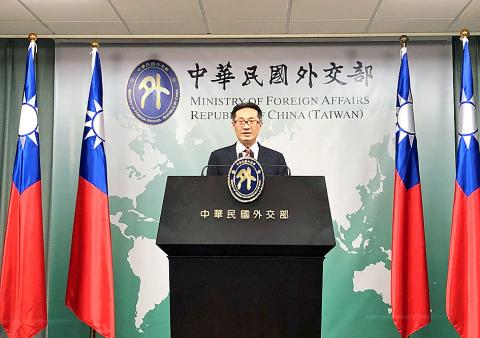Saturday’s presidential and legislative elections are drawing worldwide attention, as several foreign delegations, as well as more than 210 journalists, are to observe the voting results, the Ministry of Foreign Affairs said yesterday.
Three delegations from Europe — a four-member legislative delegation from Sweden, a five-member legislative delegation from Ireland and a five-member delegation of academics from Denmark — are to observe the elections, Department of European Affairs Deputy Director-General Ko Liang-jui (柯良叡) told a news briefing in Taipei.
They are to visit the Central Election Commission’s poll center and local ballot stations, he said, adding that foreign parliamentary groups had previously observed elections in Taiwan.

Photo: CNA
More than 210 international journalists — 60 originally stationed in Taiwan and more than 150 flying in from other nations — representing 100 media agencies have applied for permits to cover the elections, ministry spokeswoman Joanne Ou (歐江安) said.
Minister of Foreign Affairs Joseph Wu (吳釗燮) is to brief them on background information related to Taiwan’s democracy and election system, Ou said, adding that they are traveling to the nation at their own expense.
There would also be several groups from the US and other countries, she said, but added that the ministry could not provide a list at the moment.
Separately yesterday, US Senator Rick Scott said on Twitter that “Taiwan’s election is vital to the continued fight for human rights & freedom in the region.”
“Allowing Communist China’s influence to spread will only open more doors for oppression. We must stand with our brothers & sisters in #HongKong & #Taiwan,” he wrote.
In related news, Ko is later this month to succeed Representative to the Czech Republic Wang Chung-yi (汪忠一) as Taiwan’s envoy to the European nation.
Asked if Czech Senate President Jaroslav Kubera might change his plan to visit Taiwan after the elections due to Beijing’s influence, Ko said that Kubera has repeatedly expressed his plan to visit Taiwan and that the ministry welcomes his visit.
Prague has placed a great emphasis on attracting foreign investment, and Taiwan and the Czech Republic have many collaborative opportunities in industry, culture and technology, Ko said, adding that he hopes to make Taiwan better-known among the Czech public.

SECURITY: As China is ‘reshaping’ Hong Kong’s population, Taiwan must raise the eligibility threshold for applications from Hong Kongers, Chiu Chui-cheng said When Hong Kong and Macau citizens apply for residency in Taiwan, it would be under a new category that includes a “national security observation period,” Mainland Affairs Council (MAC) Minister Chiu Chui-cheng (邱垂正) said yesterday. President William Lai (賴清德) on March 13 announced 17 strategies to counter China’s aggression toward Taiwan, including incorporating national security considerations into the review process for residency applications from Hong Kong and Macau citizens. The situation in Hong Kong is constantly changing, Chiu said to media yesterday on the sidelines of the Taipei Technology Run hosted by the Taipei Neihu Technology Park Development Association. With

‘FORM OF PROTEST’: The German Institute Taipei said it was ‘shocked’ to see Nazi symbolism used in connection with political aims as it condemned the incident Sung Chien-liang (宋建樑), who led efforts to recall Democratic Progressive Party (DPP) Legislator Lee Kun-cheng (李坤城), was released on bail of NT$80,000 yesterday amid an outcry over a Nazi armband he wore to questioning the night before. Sung arrived at the New Taipei City District Prosecutors’ Office for questioning in a recall petition forgery case on Tuesday night wearing a red armband bearing a swastika, carrying a copy of Adolf Hitler’s Mein Kampf and giving a Nazi salute. Sung left the building at 1:15am without the armband and apparently covering the book with a coat. This is a serious international scandal and Chinese

COUNTERINTELLIGENCE TRAINING: The ministry said 87.5 percent of the apprehended Chinese agents were reported by service members they tried to lure into becoming spies Taiwanese organized crime, illegal money lenders, temples and civic groups are complicit in Beijing’s infiltration of the armed forces, the Ministry of National Defense (MND) said in a report yesterday. Retired service members who had been turned to Beijing’s cause mainly relied on those channels to infiltrate the Taiwanese military, according to the report to be submitted to lawmakers ahead of tomorrow’s hearing on Chinese espionage in the military. Chinese intelligence typically used blackmail, Internet-based communications, bribery or debts to loan sharks to leverage active service personnel to do its bidding, it said. China’s main goals are to collect intelligence, and develop a

A US Marine Corps regiment equipped with Naval Strike Missiles (NSM) is set to participate in the upcoming Balikatan 25 exercise in the Luzon Strait, marking the system’s first-ever deployment in the Philippines. US and Philippine officials have separately confirmed that the Navy Marine Expeditionary Ship Interdiction System (NMESIS) — the mobile launch platform for the Naval Strike Missile — would take part in the joint exercise. The missiles are being deployed to “a strategic first island chain chokepoint” in the waters between Taiwan proper and the Philippines, US-based Naval News reported. “The Luzon Strait and Bashi Channel represent a critical access